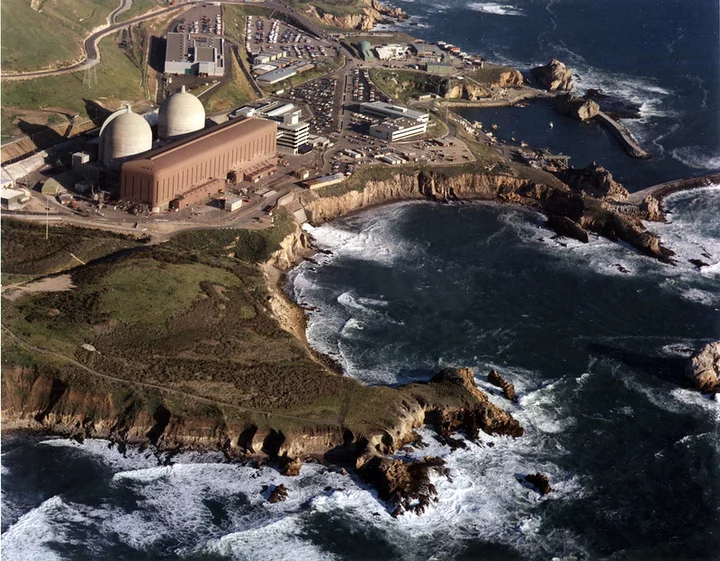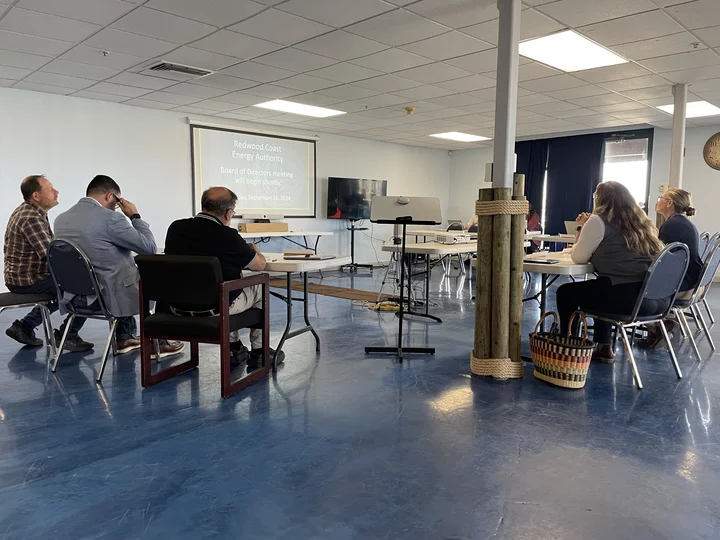The Diablo Canyon Nuclear Power Plant, in San Luis Obispo County, is the last remaining operational nuclear plant in California. | Image via the Nuclear Regulatory Commission, CC BY-NC-ND 2.0.
###
At a meeting held Thursday evening in Eureka’s Wharfinger Building, the board of directors of the Redwood Coast Energy Authority (RCEA) opted not to accept an allocation of nuclear energy into the mix of power sources it purchases on behalf of local ratepayers.
Through PG&E’s California’s Community Choice Aggregation program, RCEA functions as the default provider of electricity generation for the vast majority of consumers in Humboldt County. Since 2017, the agency has been purchasing electricity from a variety of mostly green, renewable sources and then re-selling that energy to its roughly 63,000 local customers at slightly lower rates than PG&E customers would otherwise pay.
The dilemma the board faced last night was this: Should RCEA accept a short-term allocation of the power being generated by the Diablo Canyon Nuclear Power Plant — power that all electricity users in California are already paying for — or should it refuse on principle given environmental concerns such as the problem of safe nuclear waste storage?
At last month’s RCEA meeting, the board heard from Jaclyn Harr, an account director with nonprofit portfolio management company The Energy Authority. She reminded board members that the two nuclear reactors at the Diablo Canyon plant, owned and operated by PG&E, were scheduled to be retired from service by the end of 2025. But 2022 legislation will allow the reactors to keep running through at least October of 2030.
While California is working to transition to renewable energy, it’s had trouble getting clean alternatives to carbon dioxide-spewing sources online as quickly as anticipated. And so, in 2022, at the urging of Gov. Gavin Newsom, the state legislature approved a $1.4 billion loan to PG&E to help maintain the reliability of California’s power grid by keeping Diablo Canyon running. It currently supplies 10 percent of the energy in the state grid.
As part of the deal to keep the nuclear plant operating, all jurisdictional entities under the California Public Utilities Commission (CPUC) are paying a share of the costs, and they all have the option of receiving an allocation of the power generated by Diablo Canyon. This power would be “free” in the sense that all ratepayers across the state, including us here in Humboldt County, are already paying for it, whether we like it or not.
But RCEA has a longstanding provision in its risk policy prohibiting the inclusion of nuclear power in its portfolio, except for short-term purposes. Members of RCEA’s board of directors, including Eureka City Councilmember Scott Bauer, voiced serious concerns last month about the long-term consequences of storing nuclear waste, including isotopes such as uranium-235, which remains radioactive for hundreds of millions of years.
At the same time, however, RCEA is working to reach a 100 percent carbon-free energy supply in the coming years, and the nuclear power coming from Diablo Canyon technically meets that criteria.
And then there are financial concerns. The cost of emissions-free energy resources have been increasing, especially when looking for long-term deals, and while RCEA has some financial reserves, is it fiscally prudent to turn down “free” electricity? Accepting the allocation would save the agency about half a million dollars, which represent about 5.4 percent of RCEA’s net losses for 2025.
Specific allocation amounts have not yet been published, but according to a staff report, RCEA’s allocation would likely only meet about 2% of 2025 power portfolio.
“So it’s a modest savings, either of money or a modest savings in [greenhouse gas] emissions,” RCEA Power Resources Director Richard Engel told the board. He said staff knows of two other community choice aggregators in California that have accepted the allocation.
RCEA board members and staff gather at the Wharfinger Building/
During the public comment period, a number of people urged the board to turn down the allocation.
“I think it would be reprehensible of RCEA to accept nuclear power into the mix of quote-unquote, clean energy that we accept,” said Arcata resident Kathleen Marshall, adding that it’s not carbon neutral to build a nuclear power plant or mine for uranium. She also voiced concerns about the potential for disaster if an earthquake were to strike either near Diablo Canyon or here in Humboldt, where spent nuclear fuel rods are stored along Humboldt Bay.
Fellow Arcata resident Dave Ryan called nuclear power “a really messy source of energy,” and with more community solar power projects coming online, including a recently approved 2.8 megawatt array along Hwy. 36, Ryan urged the board to “exercise some integrity” and “send a message that you’re not going to be an agency to support this.”
Cal Poly Humboldt grad student Alexander Brown spoke about the long-term ramifications of storing spent nuclear fuel, saying, “I don’t think, as a nation, we know what we’re doing with it.”
Michael Welch, reading a statement on behalf of the environmental organization Redwood Alliance, also urged RCEA to reject the allocation, arguing that accepting it would send the wrong message.
“Any amount of saying ‘yes’ to nuclear energy only bolsters the efforts of the nuclear industry,” he said.
When the matter came back to the board, Bauer reiterated the concerns he expressed at last month’s meeting.
“We’re always looking at how to run efficiently,” he said. But he also argued that RCEA has a responsibility to the community, to the world and to the “800 generations, at least” that could be forced to coexist with radioactive waste. “[O]ur responsibility should be to not accept it,” he said.
But fellow Director Skip Jorgensen, who represents the City of Ferndale on the board, expressed concerns about RCEA’s dwindling financial reserves and said he’d favor a one-year agreement to accept the allocation “with my nose pinched.”
Director Elise Scafani, representing the City of Blue Lake, asked whether accepting the allocation would be more palatable if RCEA dedicated the half-million-dollars in savings to the development of local, renewable energy.
“We know that this energy is being generated … whether we accept it or not,” she said. “What can we do with that reality to make our overall picture going forward improved?”
Humboldt County Supervisor Mike Wilson, an alternate on the board sitting in on behalf of fellow Supervisor Natalie Arroyo, spoke at length about various dimensions of this quandary, touching on such matters as the importance of fiscal responsibility and the scientific reality that, despite the creative dynamics of community choice aggregation, the vast majority of electricity actually being used here in Humboldt County comes via the fracked natural gas that powers PG&E’s Humboldt Bay Generating Station just south of Eureka.
As such, Wilson said, RCEA’s choice really comes down to the importance and efficacy of sending a message. “I don’t know if we’re going to lead the charge or just be sort of standing out in the cold” if the agency takes a stand and rejects its allocation, he said.
He also noted that Arroyo was leaning toward receiving the allocation, though he said his own heart wants to do away with nuclear power generation.
Director Jason Ramos, representing the Blue Lake Rancheria, said he agreed with Bauer and thinks accepting nuclear power would dilute RCEA’s mission. “Doesn’t seem worth it to me,” he said. [DISCLOSURE: The Blue Lake Rancheria is a minority owner of the Outpost’s parent company, Lost Coast Communications, Inc.]
Bauer made a motion to not accept the allotment. Alternate Director Michelle Fuller, who was sitting in for Board Chair Sheri Woo, offered to second the motion but she was reminded that as the representative for the Humboldt Bay Municipal Water District, she’s a non-voting member.
Bauer’s motion never did receive a second.
Scafani then made a motion to accept the allocation for calendar year 2025 and dedicate the savings to developing local, renewable energy. Jorgensen seconded the motion after asking for inclusion of a provision to revisit the decision early next year. He also quipped, “Getting clean is a dirty business.”
Several board members were absent, and when it came time to decide, the motion received only two “yes” votes — Scafani’s and Jorgensen’s. The absent board members count as “no” votes in RCEA’s proceedings, In order for the motion to pass, a staff member explained that every voting member present would need to vote “yes,” and thus the motion failed.
A letter will be sent to the CPUC explaining the agency’s decision, and staff will come back at a future meeting to ask the board whether it would like to revise its current nuclear policy.


CLICK TO MANAGE